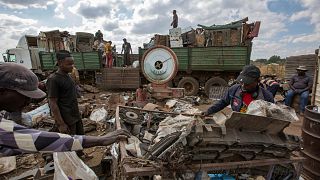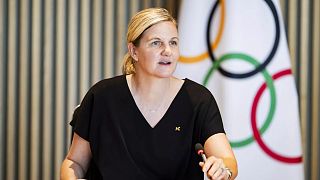Zimbabwe
As the dust settles on the disputed July 30 presidential election in Zimbabwe, president Emmerson Mnangagwa on Tuesday laid out his plans for reviving the economy that has been struggling since 1999.
Mnangagwa’s inaugural address to parliament was marked by an opposition walkout who insist on denouncing the ruling ZANU-PF’s party victory.
While the leader of the main opposition party, Nelson Chamisa who lost out to Mnangagwa, is not a legislator, members of his Movement for Democratic Change party heckled Mnangagwa when he started reading his speech before filing out.
“As the MDC we cannot sit there and be addressed by a person who does not even respect the rule of law,” MDC national chairperson Tabitha Khumalo said.
The opposition inisists that Chamisa won the presidential polls and were planning on conducting a mock inauguration last weekend before a ban on public gatherings in the wake of a cholera epidemic, forced them to postpone the event.
ZANU-PF responds
ZANU-PF’s chief whip in parliament Pupurai Togarepi described the lawmakers’ conduct as unfortunate, adding: “We hope that over time they will come to their senses, it’s not about grandstanding but building the country together.”
Mnangagwa, who has previously called for unity among political parties to help rebuild the shattered economy, said the elections were now in the past.
“The election period is decisively behind us. It is now time for us as members of parliament and political leaders to exert our efforts towards delivering promises we made to the electorate,” Mnangagwa said in his speech.
Mnangagwa’s plans
The president promised to bring a series of bills to parliament, including on giving more power to Zimbabwe’s 10 regions, revamping the process of registering companies and creating a one-stop investment agency.
He told lawmakers that his government had negotiated $500 million in foreign credit facilities, some of which would be disbursed to companies this week.
Britain’s ambassador in Harare on Tuesday, Catriona Laing said her country sill support Zimbabwe to get on to an interim IMF staff programme to help the country quickly clear its foreign arrears.
Clearing the $1.8 billion in arrears to the World Bank and African Development Bank is seen as a major step for Zimbabwe to start accessing foreign credit, especially for the private sector as well as foreign direct investment.
Zimbabwe, which is trying to shake off its international pariah tag, started defaulting on its foreign debt in 1999. The West put sanctions on the country in 2002 as punishment against former President Robert Mugabe’s government, which was accused of vote fraud and rights abuses.
Mnangagwa, however, said the country would not immediately re-introduce its own currency that was dumped in 2009 after it was made worthless by hyperinflation of 500 billion percent.













Go to video
Togo protest crackdown raises fears of worsening political crisis
Go to video
Tunisia sentences prominent opposition leader to 14 years in prison
01:01
Chad’s former Prime Minister appeals to Macron after two months in detention
Go to video
Zimbabwe court rejects opposition bid to block Gukurahundi massacre hearings
02:19
South African actor Embeth Davidtz makes directorial debut with Rhodesia-set drama
00:52
Nigeria’s Peter Obi to contest 2027 election, opposition coalition in jeopardy